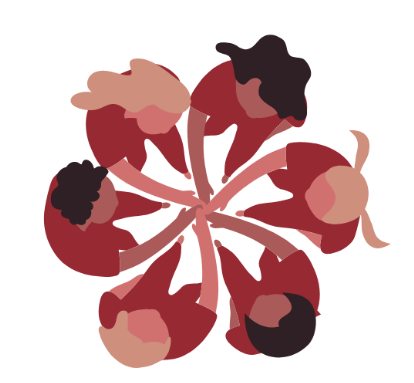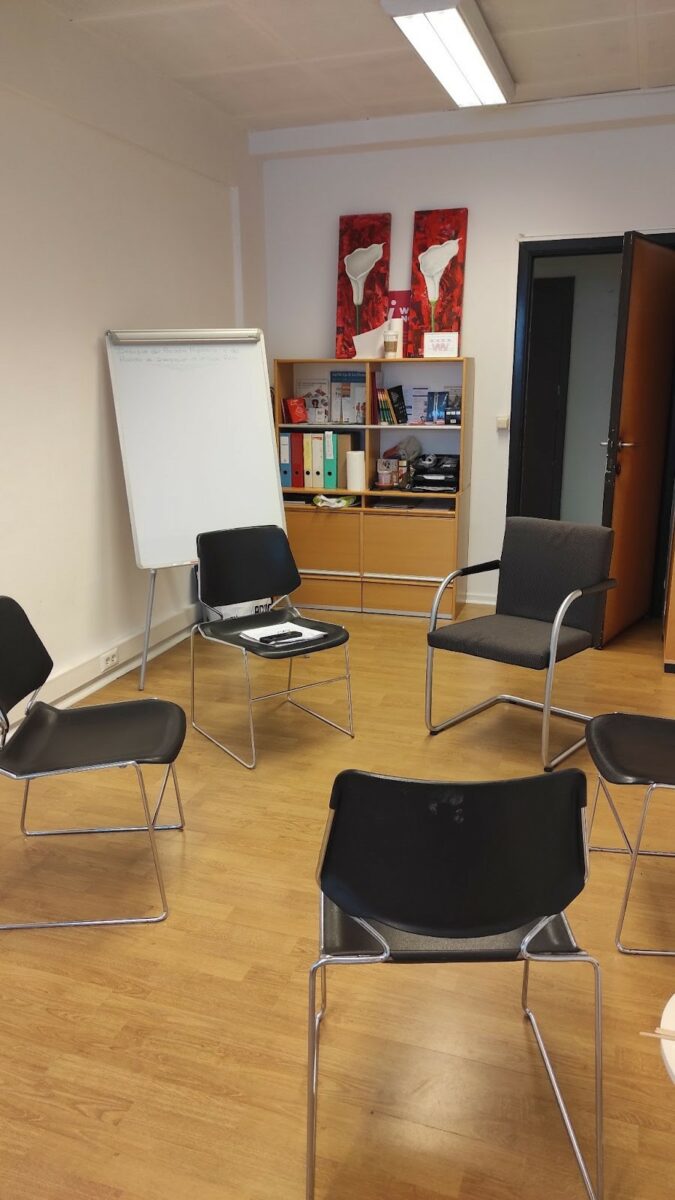
Women Now accompanies immigrant women in the face of the various challenges experienced in their migratory trajectory, from an inclusive and benevolent perspective. Following the development of individual support, the association is now seeking to develop another type of support in order to make it more complete and diversified. To do this, various discussion and support groups have been created. One of them deals with the challenges related to the process of migration and integration in a new country. A question then arises: in what way does the group offer a specific space to women of immigrant origin?
During our sessions, each participant relies on the presence of others, their resources and their exchange of personal experiences.
To encourage these exchanges, short activities are offered, either by the workers or by the women themselves. During the first session, for example, we made an individual presentation, through different images available. Each of the participants was free to choose a few images to present themselves through.
Thus, we have tried to simplify the first contacts and create a basis of trust. Together, they now form a social group, which we can go so far as to qualify as a social network with many resources!
In general, this social environment plays an important role in various psychological processes. First of all, the support it provides reduces acculturative stress* and the physical and mental health problems caused by this same stress (Lueck and Wilson, 2010). The migratory trajectory is a long journey filled with moments of joy but also with difficulties that must be faced. The social environment can provide useful resources to cope with these different stresses (Katsiaficas et al, 2013; Kim et al, 2008).

One of our objectives through the support group, which constitutes a benevolent social environment, is therefore to promote the reduction of the acculturative stress of our participants, the intensity of which will be different depending, among other things, on the reasons for leaving but also from one individual to another. Our participants do not represent an isolated case: it is a stress that affects anyone with a migration path and which is therefore part of a common and legitimate process.
However, we also seek to strengthen the resilience and agency processes of our participants. These are two psychological processes involving finding strategies to cope with or adapt to difficult situations (Scott et al, 2009; Masten, 2015; Feder et al, 2011). Being surrounded can therefore promote the power to act. A highly developed social envelope is useful to people with an immigrant background in their ability to become or become actors again in their lives.
Through our discussion groups, we therefore seek to create an important social environment that will strengthen the processes of resilience and agency. (Kamanzi et al, 2007). The group will generate a dynamic conducive to the development of solidarity and psychic resources to face reality (Raybaud-Macri, 2017).
Finally, it is obviously a space for benevolent speech, where everyone can be heard. Being able to share your story with other women with similar experiences helps you not feel alone in the face of the situation. Indeed, the active participation of each reinforces the feeling of understanding (Pariente, 2020). The multiple testimonies encourage others in their own journey in the face of the challenges of migration processes.

Our support groups can then be the gateway to the creation of a benevolent social environment, useful to face the challenges of the migratory process encountered by these women. We have already been able to observe a reduction in acculturative stress thanks to favored agency and resilience. Indeed, despite the different migratory paths, the women were able to discuss, listen to and support each other in the face of the different situations experienced, thus creating a benevolent and empathetic environment.
Margaux Laurens
Intern Social Psychologist at Women Now
*It results in the efforts made by the person to minimize or resolve cultural differences with the host culture (Born, 1970). Acculturative stress is therefore a response to events experienced by the person in their cultural adaptation.
Bibliography
Born, D.O. (1970). Psychological adaptation and development under acculturative stress: Toward a general model. Social Science & Medecine, 3 (4), 529-547. http://dx.doi.org/10.1016/0037-7856 (70)90025-9
Feder, A., Haglund, M., Wu, G., Southwick, S. M., & Charney, D. S. (2011). The Neurobiology of Resilience. In Neurobiology of Mental Illness (p. 1144-1153). Oxford University Press. DOI: 10.1093/med/9780199934959.001.0001
Kamanzi, C., Zhang, X. Y., Deblois, L., & Deniger, M.-A. (2007). L’influence du capital social sur la formation du capital humain chez les élèves résilients de milieux socioéconomiques défavorisés. Revue des sciences de l’éducation, 33(1), 127-145. https://doi.org/10.7202/016192ar
Katsiaficas, D., Suárez-Orozco, C., Sirin, S. R., & Gupta, T. (2013). Mediators of the relationship between acculturative stress and internalization symptoms for immigrant origin youth. Cultural Diversity and Ethnic Minority Psychology, 19(1), 27-37. https://doi.org/10.1037/a0031094
Kim, H. S., Sherman, D. K., & Taylor, S. E. (2008). Culture and social support. American Psychologist, 63(6), 518–526. https://doi.org/10.1037/0003-066X
Lueck, K., & Wilson, M. (2010). Acculturative Stress in Asian Immigrants : The Impact of Social and Linguistic Factors. International Journal of Intercultural Relations – INT J INTERCULT RELAT, 34, 47-57. https://doi.org/10.1016/j.ijintrel.2009.10.004
Masten, A. S. (2015). Ordinary Magic : Resilience in Development. Guilford Publications.
Pariente, K. (2020). 49. Groupes de parole et thérapies de groupe. Dans : Marianne Kédia éd., Psychotraumatologie (pp. 498-503). Paris: Dunod. https://doi.org/10.3917/dunod.kedia.2020.01.0498
Raybaud-Macri, F. (2017). Le groupe de parole: Un soutien thérapeutique. Les Cahiers Dynamiques, 71, 162-166. https://doi.org/10.3917/lcd.071.0162 Scott, J., & Marshall, G. (2009). A Dictionary of Sociology. Oxford University Press.
